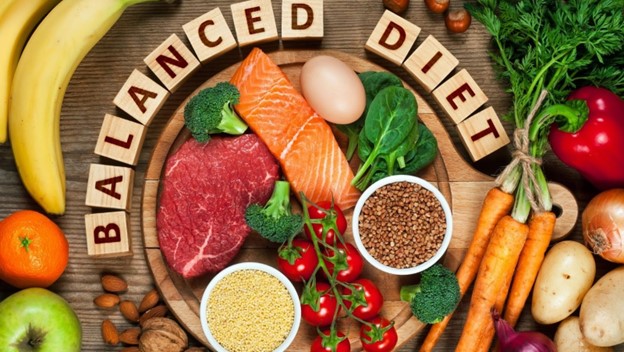Welcome to the world of flexible dieting, a lifestyle that’s taking the health and fitness industry by storm. It’s not just another fad diet; it’s a sustainable, balanced approach to eating that’s transforming lives across the globe.
Flexible dieting, also known as ‘If It Fits Your Macros’ (IIFYM), is a nutritional concept that focuses on the type of calories consumed, rather than the quantity. It’s a liberating shift from restrictive diets, offering freedom and flexibility while still achieving your fitness goals.
Flexible Dieting Lifestyle
 At the center of a flexible dieting lifestyle, also known as ‘If It Fits Your Macros’ (IIFYM), sits the philosophy that no food category is off-limits. This approach to nutrition shatters the conventional concept of dieting. Rather than focusing merely on calorie restriction, it emphasizes a balanced distribution of macronutrients – proteins, fats, and carbohydrates.
At the center of a flexible dieting lifestyle, also known as ‘If It Fits Your Macros’ (IIFYM), sits the philosophy that no food category is off-limits. This approach to nutrition shatters the conventional concept of dieting. Rather than focusing merely on calorie restriction, it emphasizes a balanced distribution of macronutrients – proteins, fats, and carbohydrates.
A flexible dieting lifestyle defines ratios of macronutrients suitable for an individual’s specific goals. For example, a person aiming to build muscle might have a higher protein intake, while someone trying to lose weight could focus on reducing carbohydrate intake. This approach offers practical guidelines while allowing for occasional indulgences, fostering a healthier relationship with food.
How Flexible Dieting Promotes Sustainable Weight Loss
 Flexible dieting’s non-restrictive approach promotes sustainable weight loss, defying the myth that certain food categories lead to weight gain. Unlike typical diets, it does not penalize overeating, but instead encourages a balanced macronutrient consumption. By endorsing all food groups, flexible dieting avoids the pitfall of nutrient deprivation commonly associated with restrictive diets, making it a safe and sustainable weight loss strategy.
Flexible dieting’s non-restrictive approach promotes sustainable weight loss, defying the myth that certain food categories lead to weight gain. Unlike typical diets, it does not penalize overeating, but instead encourages a balanced macronutrient consumption. By endorsing all food groups, flexible dieting avoids the pitfall of nutrient deprivation commonly associated with restrictive diets, making it a safe and sustainable weight loss strategy.
For example, a flexible dieter doesn’t face guilt after indulging in a slice of chocolate cake, instead, they adjust their food intake for the rest of the day to maintain an optimal macronutrient balance. This approach facilitates positive dietary habits, making it easier to maintain a healthy weight over an extended period. As various studies from trusted institutes such as Harvard and Yale confirm, sustainable weight loss isn’t just about shedding pounds temporarily, but maintaining optimal weight long-term. Flexible dieting aligns perfectly with this paradigm shift in weight management. Therefore, flexible dieting guides individuals to eat smarter, leading to sustainable weight loss and an overall healthier lifestyle.
Benefits of Adopting a Flexible Dieting Approach
 Embracing a flexible dieting approach reaps multifarious benefits. It fosters a cost-effective nutrition plan, relieving the financial pressure typically linked with exclusive dietary regimens. People choose from a broader array of options that both target their nutritional requirements and suit their budget. By deciphering nutrition labels for macronutrient content, they masterfully tailor meal inclusions, finding an ideal balance between nutrition, taste, and affordability.
Embracing a flexible dieting approach reaps multifarious benefits. It fosters a cost-effective nutrition plan, relieving the financial pressure typically linked with exclusive dietary regimens. People choose from a broader array of options that both target their nutritional requirements and suit their budget. By deciphering nutrition labels for macronutrient content, they masterfully tailor meal inclusions, finding an ideal balance between nutrition, taste, and affordability.
Through flexible dieting, individuals relinquish fear and anxiety tied to occasional indulgences. By not labeling foods as ‘good’ or ‘bad,’ people cultivate healthier eating instincts, subconsciously regulating their consumption. Consequently, their relationship with food matures, catalyzing mental wellbeing. By providing a balanced nutritional framework rather than a tight restrictive regimen, it nurtures sustainable dietary changes. The consequent increase in diet longevity optimizes weight management in the longer run, delivering on the primary goals of precision-nutrition experience.
Challenges and Considerations in Flexible Dieting
While flexible dieting offers a liberating approach to food, it’s not without its challenges. It requires careful planning and a strong understanding of macronutrients, which might seem daunting for beginners. Overindulgence can also be a risk, as the freedom in food choices can sometimes lead to nutrient imbalance. Yet, with knowledge and practice, these hurdles can be overcome. Moreover, it’s important to remember that flexible dieting isn’t a one-size-fits-all solution. It’s a tool that can be adjusted and adapted to individual needs and lifestyles. It’s about creating a healthy relationship with food, not just counting macros. So, whether you’re a seasoned dieter or just starting out, flexible dieting could be the game-changer you’ve been looking for in your journey to sustainable weight management and better overall health.

